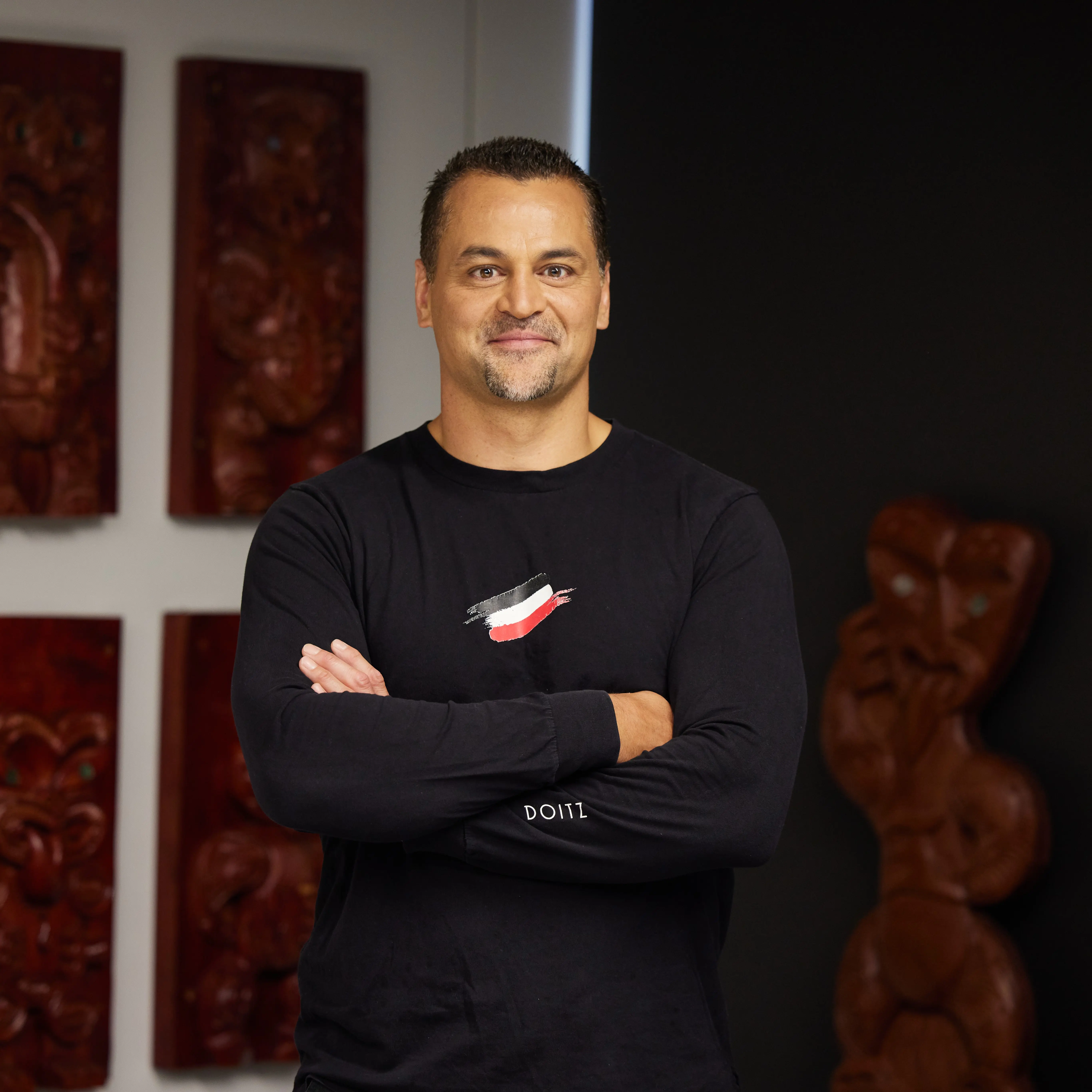Scotty Morrison
The teenaged Te Manahau (Scotty) Morrison was dabbling in the risky side of life before Te Reo Māori “found him”.
He was having fun and training hard – a super keen sportsman – but moving down a rocky path, aiming for sporting glory and the heady life that went with it.
Heading for teacher’s college to complete some sports and recreation papers, Morrison laughs as he recalls how advice from his older brother and cousins had him searching for one more paper, scheduled specifically to allow him a three-day weekend.
“Introduction to Te Reo Māori was the first I found that fit the bill so that’s where it started, almost by accident,” he has said.
“I was fortunate the language sorted me out and found me.”
Now Rotorua-born Morrison is committed to ensuring what was a fragile and endangered language is accessible, working to bring into the mainstream media, and common everyday use across New Zealand. It’s quite a feat for a man who was not raised as a native speaker of Te Reo Māori.
He has his Diploma of Teaching, Bachelor of Education, a Masters degree and is working on a PhD in Māori language. He is currently an associate professor of Te Reo Māori at Te Pūtahi-a-Toi (School of Māori Knowledge) at Massey University.
His many and diverse roles included taking a lead role in The Māori Merchant of Venice film in 2002, presenting at Oxford University on biculturalism in 2008, and travelling to Ireland with then minister Te Ururoa Flavell in 2016 to study bilingualism models. The bilingualism work was influential in Rotorua becoming our first bilingual city.
Actress and 2020 Kiwibank New Zealander of the Year Jennifer Ward-Lealand, herself a fluent speaker of Te Reo Māori and one of his BLAKE referees, has said Morrison is “a person with an enormous amount of energy and authenticity in everything he does”.
He has been called “an asset to New Zealand”, and labelled as someone who continually steps forward in a leadership capacity for the community.
Morrison is well known for giving his time and energy not only to those who are keen to learn Te Reo Māori but to those who feel disconnected from the language and culture, whether Māori or non-Māori.
“What it does for both types of students, it gives them identity, it teaches them about what their place is in Aotearoa, and how they fit into Aotearoa tanga, how they fit into this wonderful country that we live in.”
His BLAKE award referees spoke of endless hours spent writing programmes, workshops, karakia, books and wānanga to support the growth of Te Reo Māori and Tīkanga Māori, as well as time spent mentoring the next generation of speakers. Morrison says it is about “paying it forward”.
“You work hard to become an enhancer, to be someone who can provide a really highly treasured taonga to people because it was a highly treasured taonga for me, and it did so much for me. And you start to feel that the responsibility is to give that taonga to other people,” he has said.
This is echoed by designer and BLAKE Leader Kiri Nathan, who nominated Morrison for the BLAKE awards.
“His life’s work will be in the hands of thousands who will in turn harness these gifts and pay it forward. His work is moko generational.”
Morrison is the author of the bestselling language guides The Raupō Phrasebook of Modern Māori and Māori Made Easy, Māori Made Easy 2, Māori at Home, which was co-authored with his wife Stacey Morrison, and Māori at Work. His combined works have sold over 150,000 copies.
Māori Made Easy was described by Leonie Hayden in Best Books of the Decade as “a bestseller that has changed the language learning landscape in classrooms and outside them for all New Zealanders”.
The couple also founded ‘Māori 4 Grown Ups’, a community group encouraging New Zealanders to learn and speak the language.
Morrison has had varied roles in the media, including presenting long-running Te Karere and Marae, his recent series Origins as well as actively reintroducing Māori language words and terms, in order to revitalise them and bring them into more common usage.
Morrison is not comfortable with being called a leader. He says it is simply about being passionate about what you’re doing, and getting right in there with everyone else.
“I think you lead by your actions and you just put your work out there, and that’s how you lead. There are different leadership styles. Mine is more just doing things, and being visible, being at the coalface, not just standing back and giving orders but being at the coalface and doing it”.
He says New Zealand has come a long way with regard to Te Reo Māori, but has a long way still to go. He hopes we are on the cusp of change, moving towards his vision for Te Reo Māori in this country: for it to become the first language of choice for the majority of people.
“In three to four generations time, I’d love it to be part of the fabric in Aotearoa. That’s the dream.”


